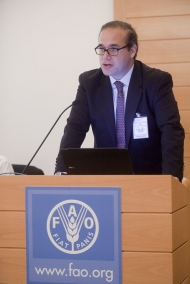In conversation with Maximo Torero Cullen
April 1, 2020
Maximo Torero Cullen
The COVID-19 pandemic has put the world on a crisis footing, with unprecedented actions to restrict movements and plans for radical deployment of public funds to combat the threat posed by a novel coronavirus that knows no boundaries. Success will entail coherent and robust plans for our food systems. Maximo Torero Cullen, Chief Economist, Food and Agriculture Organization (FAO) of the United Nations, outlines a framework for how countries can think about and craft these plans, as well as the ways the world can mitigate shocks to agriculture and food systems.
A battle plan for ensuring global food supplies during the COVID-19 crisis
As more countries adopt lockdown policies to contain and mitigate the COVID-19 crisis, is there a risk that we will run out of food?
The short answer is both yes and no.
There is that risk, but we have plenty of ways to reduce its likelihood, and the sooner we adopt them the more we can avoid exacerbating the global health crisis. We can see signs that pressures due to lockdowns are beginning to impact supply chains. Governments are rolling out large-scale campaigns against the coronavirus, and battle plans should include measures aimed at lessening the shocks to their food supply chains. So the long answer, so to speak, is no because we can’t afford to make the mistakes that would exacerbate suffering now.
What is the first step?
Coordinated policy responses encompass all steps, but let me emphasise the priority of bolstering capacities to enhance emergency food assistance and bolster safety nets for vulnerable populations. On top of that, lockdown measures translate into layoffs and reduced income, making it more of a struggle for families to put food on the table.
One-off payments, as used for example by Hong Kong and Singapore, or multiple cash transfers, using existing programmes such as the SNAP programme in the United States or China‘s move to accelerate payments of unemployment insurance, are appropriate. It’s important that such measures are robust and credible, as predictability is essential in a situation where workers are being forced to stay home and practise physical distancing.
What’s the role of global food trade?
Global food trade has to be kept going.
One of every five calories people eat have crossed at least one international border, up more than 50 per cent from 40 years ago. Countries that depend on imported food are especially vulnerable to slowing trade volumes, especially if it has been happening as their currencies decline. Countries should immediately review their trade and taxation policy options — and their likely impacts — and work in concert with one another to create a favourable environment for food trade. Open global food trade helps keep downstream food markets functioning.
What about domestic markets?
There are supply chains that are a complex web of interactions involving farmers; key inputs such as fertilisers, seeds and veterinary medicines; processing plants; freight distributors; retailers; and more. A global pandemic will quickly strain such webs, so to prevent food shortages, every effort must be made to keep them intact and moving efficiently.
The issue is not only about affordability but also about availability and accessibility. Insuring the safety of food-system workers is paramount, so on-site health measures, empowering sick-leave policies, physical distancing instructions and capabilities need to be assured, and the same applies to the delivery sector. More than a fourth of the world’s farm work is done by migrant workers, so to avoid labour shortages visa protocols should be expedited, regardless of how counterintuitive that may seem right now. End-sale points such as supermarkets have begun reducing hours and rotating staff, while contact-free delivery services are becoming more widely used.
Just as frontline healthcare workers are hailed as heroes, those who staff the critical infrastructure of our food system deserve recognition and gratitude, not stigma and neglect, during these trying times.
What about smallholder farmers?
A paradox of global hunger is that, despite their activity, smallholder farmers in the rural areas of developing countries are disproportionately at risk of food insecurity themselves, with low incomes a major reason for that. So policymakers must pay attention to them.
Another point here is that what we have seen so far is a spate of exceptional purchases of non-perishable foodstuffs. In Italy, demand for flour has spiked by 80 per cent. Temporary cash handouts for poor farmers are essential, as well as grants to restart production. Capital can be injected into the agriculture sector to help small and medium-sized agribusinesses — and their workforce — stay afloat. Governments can make a point of purchasing agricultural products from small farmers to establish strategic emergency reserves for humanitarian purposes.
Are you optimistic?
We must and will survive the coronavirus pandemic. But we must understand — now — the enormous damage that measures taken to combat it will inflict on our global food system. FAO has a lot of expertise on these matters and can help countries that need fast-tracked policy advice. By working together, we can mitigate that, and need to do so. Enacting the measures mentioned above, and actively seeking international cooperation, can help all countries brace for the battle to be engaged jointly.
This is an excerpt as published on the online platform of the Food and Agriculture Organization (FAO) of the United Nations.
For more supplementary information on food supply and distribution as well as urban farming topics, check out the articles in FuturArc’s Food issue.
To read the complete article, get your hardcopy at our online shop/newsstands/major bookstores; subscribe to FuturArc or download the FuturArc App to read the issues!
Previously Published In Conversation, Online Exclusive Feature
Contact us at https://www.futurarc.com/contact-us for older interviews.



